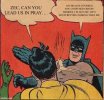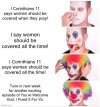Oh this is fun!
-
Biblical Families is not a dating website. It is a forum to discuss issues relating to marriage and the Bible, and to offer guidance and support, not to find a wife. Click here for more information.
You are using an out of date browser. It may not display this or other websites correctly.
You should upgrade or use an alternative browser.
You should upgrade or use an alternative browser.
Do all women need a "covering"? And what is a "covering"?
- Thread starter FollowingHim
- Start date
Well @James Pease I see why you switched to this medium. It’s way more fun and far easier than taking the time to form a consistent and logical argument and defend it. We should do all our debates this way.
I tried to read through this thread yesterday but couldn’t seem to wrap my brain around it. I figured it was the household distractions. Now I realize it was just confusing. 
Especially nerve-wracking were the words/definitions/lexicon entries. It all started here:
2 separate words, 2 separate places:
Verse 6&7
If a woman prays UNCOVERED…if a man prays COVERED.
Verse 10
A woman must have AUTHORITY on her head.
Now on to the next…
I didn’t find the word kata in vs 4. Only this word kataischunó which means to put to shame/disgrace.
…..
What significance does “to disgrace” have?
Just a few random thoughts:
No one said it’s a sin. No one said you can’t pray at any time. I’m sure there are exceptions. But most of the time, it’s a very easy, simple act. His yoke is easy and His burden light.
This is the first time I have heard anyone (from Orthodox Jews to crazy feminists and everyone in between) argue this passage does NOT have anything to do with one’s own physical head/hair. I really am fascinated. There have been some good questions raised; what about the priests and what is the assembly are a couple.
Headcovering has been quite a ride for me. It’s been about 8 years since really delving in. When bringing up the subject, there is always backlash. Why? Modern Christians ignore it, feminists despise it. Is it not telling that the practice’s disappearance coincided with feminism? There are so many cultural reasons why I believe it is important and relevant.
Now speaking from experience, I believe headcovering played a major role in revolutionizing my marriage and Christian walk. Thus I have no doubt there are spiritual truths represented by a silly piece of cloth. I know it’s just anecdotal, but I have read myriad women’s testimonies of their lives and marriages being transformed by this simple act. So while we don’t always understand the why, we experience the blessings of obedience nonetheless…. (Not too unlike other acts in the Bible: baptism, eating unleavened bread, blowing a trumpet, circumcision , etc.) .…for now we see through a glass darkly….
, etc.) .…for now we see through a glass darkly….
Ok. Now that I’ve got my brain back on track. …. Back to the more entertaining meme exchange!
Especially nerve-wracking were the words/definitions/lexicon entries. It all started here:
Since it wasn’t super clear (and maybe it’s just me), I had to look up what verse this G1849 was in.@NickF please define the word covered in verse 4 in context of having the man covered.
@NickF and @The Revolting Man
Please interpret verse 10. A woman ought to have what on her head? The word I find is this. Authority/power. Is this her covering or what is this? And she should only have authority on her head while praying and prophesying right?
G1849 - exousia
And within short order, I see I am not the only one confused by the Greek lexicon copy and paste.@NickF came up with a very different definition of the word covering. Can you share your source for this definition?
And now we see the answer compounding the confusion. The word “exousia” in vs 10, as shown from aforementioned lexicon entry (and the lengthy references later listed), indeed means authority. But vs 10 is clearly not the verse containing the word “covering” which is used in vs 6&7 and was defined here:BLB, using the Greek language that they translated it from. Not 1 verse used anywhere in the new Testament uses this verse as a physical covering. Unless you want to use it in this Corinthians passage this way.
So to recap.
2 separate words, 2 separate places:
Verse 6&7
If a woman prays UNCOVERED…if a man prays COVERED.
Verse 10
A woman must have AUTHORITY on her head.
Now on to the next…
Being that this fascinating conversation is one of my favorites, I naturally have to look up everything now.You have not defined the word kata that appears in verse 4.
I didn’t find the word kata in vs 4. Only this word kataischunó which means to put to shame/disgrace.
…..
So I’m not even sure why we’re defining kata…The KJV translates Strong's G2596 in the following manner: according to (107x), after (61x), against (58x), in (36x), by (27x), daily (with G2250) (15x), as (11x), miscellaneous (165x).
Outline of Biblical Usage [?]
- down from, through out
- according to, toward, along
What significance does “to disgrace” have?
Authority, the same kind James argues for, except with a physical representation, a piece of cloth. An extra outward sign to the world (and whatever this “because of the angels” business is).I'll choose deflect until you define authority in verse 10. The "authority or power" that a woman should have over her head.
Just a few random thoughts:
No one said it’s a sin. No one said you can’t pray at any time. I’m sure there are exceptions. But most of the time, it’s a very easy, simple act. His yoke is easy and His burden light.
This is the first time I have heard anyone (from Orthodox Jews to crazy feminists and everyone in between) argue this passage does NOT have anything to do with one’s own physical head/hair. I really am fascinated. There have been some good questions raised; what about the priests and what is the assembly are a couple.
Headcovering has been quite a ride for me. It’s been about 8 years since really delving in. When bringing up the subject, there is always backlash. Why? Modern Christians ignore it, feminists despise it. Is it not telling that the practice’s disappearance coincided with feminism? There are so many cultural reasons why I believe it is important and relevant.
Now speaking from experience, I believe headcovering played a major role in revolutionizing my marriage and Christian walk. Thus I have no doubt there are spiritual truths represented by a silly piece of cloth. I know it’s just anecdotal, but I have read myriad women’s testimonies of their lives and marriages being transformed by this simple act. So while we don’t always understand the why, we experience the blessings of obedience nonetheless…. (Not too unlike other acts in the Bible: baptism, eating unleavened bread, blowing a trumpet, circumcision
Ok. Now that I’ve got my brain back on track. …. Back to the more entertaining meme exchange!
Excellent detective work my dear!I tried to read through this thread yesterday but couldn’t seem to wrap my brain around it. I figured it was the household distractions. Now I realize it was just confusing.
Especially nerve-wracking were the words/definitions/lexicon entries. It all started here:
Since it wasn’t super clear (and maybe it’s just me), I had to look up what verse this G1849 was in.
And within short order, I see I am not the only one confused by the Greek lexicon copy and paste.
And now we see the answer compounding the confusion. The word “exousia” in vs 10, as shown from aforementioned lexicon entry (and the lengthy references later listed), indeed means authority. But vs 10 is clearly not the verse containing the word “covering” which is used in vs 6&7 and was defined here:
So to recap.
2 separate words, 2 separate places:
Verse 6&7
If a woman prays UNCOVERED…if a man prays COVERED.
Verse 10
A woman must have AUTHORITY on her head.
Now on to the next…
Being that this fascinating conversation is one of my favorites, I naturally have to look up everything now.
I didn’t find the word kata in vs 4. Only this word kataischunó which means to put to shame/disgrace.
…..
So I’m not even sure why we’re defining kata…
What significance does “to disgrace” have?
Authority, the same kind James argues for, except with a physical representation, a piece of cloth. An extra outward sign to the world (and whatever this “because of the angels” business is).
Just a few random thoughts:
No one said it’s a sin. No one said you can’t pray at any time. I’m sure there are exceptions. But most of the time, it’s a very easy, simple act. His yoke is easy and His burden light.
This is the first time I have heard anyone (from Orthodox Jews to crazy feminists and everyone in between) argue this passage does NOT have anything to do with one’s own physical head/hair. I really am fascinated. There have been some good questions raised; what about the priests and what is the assembly are a couple.
Headcovering has been quite a ride for me. It’s been about 8 years since really delving in. When bringing up the subject, there is always backlash. Why? Modern Christians ignore it, feminists despise it. Is it not telling that the practice’s disappearance coincided with feminism? There are so many cultural reasons why I believe it is important and relevant.
Now speaking from experience, I believe headcovering played a major role in revolutionizing my marriage and Christian walk. Thus I have no doubt there are spiritual truths represented by a silly piece of cloth. I know it’s just anecdotal, but I have read myriad women’s testimonies of their lives and marriages being transformed by this simple act. So while we don’t always understand the why, we experience the blessings of obedience nonetheless…. (Not too unlike other acts in the Bible: baptism, eating unleavened bread, blowing a trumpet, circumcision, etc.) .…for now we see through a glass darkly….
Ok. Now that I’ve got my brain back on track. …. Back to the more entertaining meme exchange!
So your conjecturing the head covering is for a representation of authority. But only when praying and prophesying. Outside of praying and prophesying there is no need to have authority on her head?Authority, the same kind James argues for, except with a physical representation, a piece of cloth. An extra outward sign to the world (and whatever this “because of the angels” business is).
To you the cloth represents authority? And does it only represent authority while praying and prophesying?
Please quote the scriptural exceptions.No one said it’s a sin. No one said you can’t pray at any time. I’m sure there are exceptions.
The actual piece of cloth covering, correct. She is perpetually under her husband’s spiritual authority.So your conjecturing the head covering is for a representation of authority. But only when praying and prophesying. Outside of praying and prophesying there is no need to have authority on her head?
This is the same question.To you the cloth represents authority? And does it only represent authority while praying and prophesying?
I never said there were.Please quote the scriptural exceptions.
Last edited:
Sorry not trying to double ask, just making sure. So to be clear, the cloth has no significance of authority outside of praying and prophesying?The actual piece of cloth covering, correct. She is perpetually under her husband’s spiritual authority.
This is the same question.
I never said there were.
Scripturally, no.Sorry not trying to double ask, just making sure. So to be clear, the cloth has no significance of authority outside of praying and prophesying?
But the instruction is to uncover his head. If Messiah is both the head and the covering then you have some absurdities to resolve. Are you advocating for un-Messiahing the Messiah?It seems I did not understand what you were asking.
I'm not saying that. Im not saying that a man when he covers his head puts on the messiah. Maybe rephrasing it will help?
The Messiah is the Head of man. If man puts someone between him and the Messiah he covers his head.
Messiah provides headship for a man.
And anything to do with Messiah is ridiculous in context. The implication is that the covering is optional in certain situations: i.e. not praying. Messiah is never optional. You have not thought this through.
No, I can not tell you what year this happened and it doesn’t matter. You can’t tell me what year your interpretation happened either. And who cares? We don’t know what year Christ was born. Does that mean he wasn’t?Can you rephrase or elaborate your question of why a verse with universal application is limited in the text. ?
No, Paul did not teach something contrary to Torah. Now you need to show me where men were praying or prophesying with their heads covered. You’ve shown that men did at times cover their heads. You have not shown that those men were praying or prophesying while covered.
And have you considered the lunacy of claiming a man could pray or prophesy uncovered if that covering were Christ? He’s praying and prophesying without Christ? That’s not a thing.
And how can a woman uncover when she’s not praying if that covering is her husband or father? Can she put off her husband or father when not praying? You’ve never once even tried to explain that.
So come on, pony up. You were so cocksure coming in to this conversation. Where’s the substance ? You have a hopelessly self contradictory mess of an idea. Untangle it.
Or better yet admit that you hadn’t thought through all of this and commit to spending more time and thought on it before mocking people next time.
That men shouldn’t have long hair.So what does nature teach us then?
Physically yes.Than only during praying that ita dishonorable for a woman to have her head covered?
Where is that known? Was it given at Sinai? Are you adding commands?see Paul expanding on an already known concept that a woman should be covered.
That men shouldn’t have long hair.Nature teaches us this
Physically, when praying or prophesying as stated in the text.Is it dishonorable for a woman to be uncovered? Im not sure, I
That men shouldn’t have long hair.Well what does nature tell you?
Prove it.Should a woman be uncovered? I believe that answer to be no
And no one is suggesting one. Multiple possibilities have been offered by myself and @NickF . You haven’t done a modicum of study to see if the claim is even valid. You’re just clutching it to your chest because it’s the last possible hope you have.I will never accept a tradition that made priests dishonorable, or









